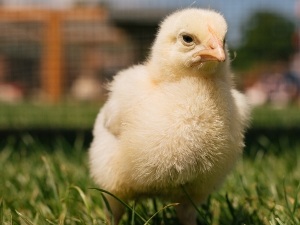
Hatching baby chicks can be tricky.
You need to make sure that the incubator settings are kept at optimum levels, you need to make sure that you don’t open the incubator too prematurely, and, you need to make sure that you turn the eggs during the incubation process.
If you do everything right, and your chicks do hatch, but one of the chicks bleeds during the hatching process then you’d be right to be concerned. This article looks into why this happens
Table of Contents
Newly hatched chick bleeding:
We’d all love the hatching stage to go easily and smoothly, unfortunately, this doesn’t always happen, below are possible reasons why your newly hatched chicks may bleed when hatching or right after hatching:
Injury while hatching:
Hatching doesn’t always go so smoothly for chicks. A chick’s skin is very soft and delicate, while eggshells are sharp and hard. The baby bird may have injured itself against the hard eggshell while hatching and started to bleed.
What to do:
This is nothing to worry about, if the baby chick hasn’t injured itself too badly, then you can leave it to heal its injuries on its own. The baby bird should be fine soon enough, just keep an eye on it to make sure that it’s doing ok.
Unabsorbed yolk:
Baby chicks grow in eggs and develop with the yolk outside of their bodies, the babies absorb the yolk during the last stage of development.
But sometimes, baby birds may hatch with the yolk partially absorbed, or hatch with the yolk completely out of their body.
If this happens, and the yolk is stepped on, forcibly removed by the chick, or is removed by the other chicks soon after hatching, then the baby will bleed profusely from the abdomen.
What to do:
You’d need to stop the bleeding as quickly as you can, applying some aureomycin to the bleeding area should help stop the bleeding.
Aureomycin is an antimicrobial powder that will keep bacteria out of the bird’s wound and will also prevent infections. It will also help with blood clotting in the area.
You can get Aureomycin relatively cheaply from your local feed store.
Using a bit of white flour on the bird’s wound may also be helpful, this will help to clot the blood as well.
If you choose to use flour then you’d also need to use an antibacterial spray like vetericyn to keep bacteria out of the bird’s wound. Betadine can also be used on the bird’s wound, it is an antibacterial agent.
If there is any yolk left on the bird then the yolk may dry up and fall off, or the bird may absorb it. The wound will close if given time. Leaving the bird in the incubator until the bird’s opening heals up is recommended.
Assisted hatching:
Assisted hatching can cause your chick to bleed profusely if a mistake is made. Assisted hatching can be very dangerous to your baby chicks.
When a chick is about to hatch, it absorbs the yolk and the blood vessels into its abdomen and then closes its body just before hatching.
If you try to help the baby hatch, but you do this too early, before the yolk and blood vessels have absorbed, then you’ll be doing more harm than good.
Helping the bird hatch too early can damage the blood vessels or the yolk, this can make the bird bleed profusely when hatching.
What to do:
The worst-case scenario is that the bleeding will result in the death of the bird.
If the bird is not bleeding profusely then you can apply some aureomycin or flour to the area to help with blood clotting. Keep an eye on the baby to see if it survives.
If the baby survives but a little bit of yolk falls off then you’d need to feed the bird as soon as the bird hatches.
You need to feed the bird earlier than normal because the yolk, which would have fed the bird for the first few days of the bird’s life, is not there anymore.
If you enjoyed this article then you may also be interested in other chicken related articles. Here are some articles that you may be interested in: Shrink Wrapped Chick, Baby Chick Swollen Abdomen, Baby Chick Not Growing Feathers, Sticky Chick, Chick Hatching With A Dry Membrane

